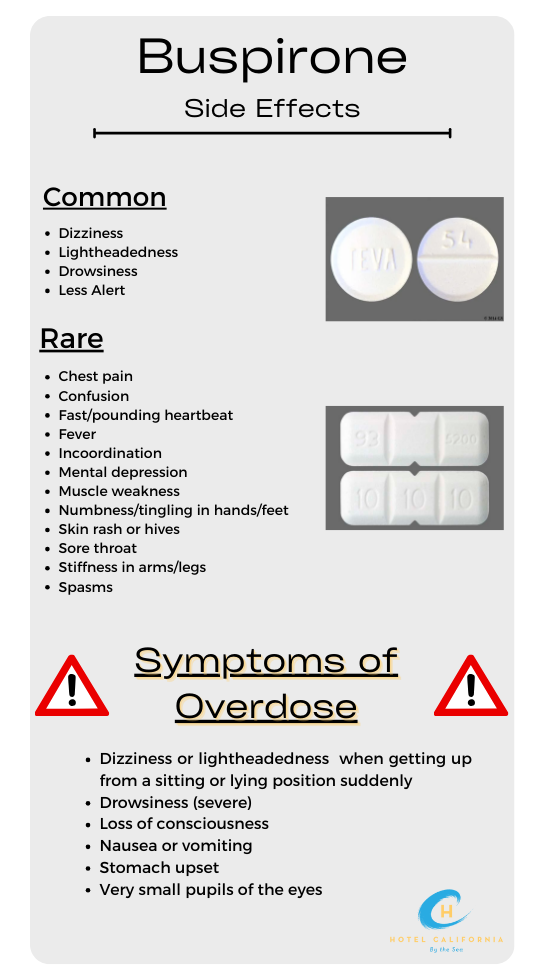Can Buspirone cause weight gain?
Anxiety disorder is one of the most common mental health disorders that affects about 19.1% of American adults. Anxiety disorders include generalized anxiety disorder, panic disorder, phobia-related disorders and social anxiety disorder. Buspirone is a popular anxiolytic treatment used to treat symptoms of various anxiety disorders and help users relax, decrease feelings of stress and worry and think more clearly. Buspar is a popular brand name for the buspirone medication. It has since been discontinued. However, many people still often refer to the generic buspirone medication as Buspar.
More than 1 million Americans use buspirone to treat their anxiety as well as any physical symptoms of anxiety that include fear, tension, irritability and dizziness. Its popularity is partly due to its non-habit-forming formulation compared to other anti-anxiety medications such as benzodiazepines. And it is the preferred choice for those who are looking for long-term medication management without the potential for abuse.

Many people often associate anti-anxiety or anti-depressant medication with weight gain. Antidepressant medications have also been known to help treat symptoms of anxiety such as SSRIs, SNRIs, TCAs, benzodiazepines, beta blockers and MAOIs. The most commonly prescribed drugs include Xanax, Ativan and Valium. These drugs treat anxiety and can also result in weight changes including weight gain.
Buspirone is generally not a medication that causes weight gain. In general, there are no significant links between anti-anxiety medications and weight gain. However, there are reported less than 1% of cases in which users did experience some sort of weight gain while taking buspirone.
What is Buspirone?
Buspirone falls under one of five categories of psychiatric prescription medications: antidepressants, antipsychotics, anxiolytics (anti-anxiety medication), mood stabilizers, and stimulants. Buspirone is an anxiolytic, a type of non-benzo anti-anxiety medication. Some common side effects of buspirone include dizziness, nausea, headache, fatigue, nervousness, shortness of breath, GI conditions, disturbed sleep, chest pain, restlessness, worsening anxiety and effects on the central nervous system.
Does Buspirone cause weight gain?
Contrary to what many believe, buspirone weight gain is not a common occurrence. In fact, the medication is rarely associated with weight changes in users. Research has found that buspirone doesn’t directly affect changes in a user’s appetite. The medication does produce calming effects that can result in changes such as an increase in eating habits in those whose stress resulted in a lack of appetite.
However, the medication does produce various side effects that can affect weight change. This is because weight changes are more likely due to symptoms of anxiety rather than the actual medication.

Various factors that can cause weight gain:
- Comfort eating. Untreated anxiety can cause patients to seek comfort in sugar or other processed and unhealthy foods. In some cases, clients with treated anxiety disorders can begin to regain a healthy appetite or even an increase in appetite. Recovering from anxiety’s loss of appetite symptoms can put a person back onto normal eating habits.
- Changes in metabolic rate
- Fatigue and changes in energy levels. Tiredness and drowsiness, which are symptoms of buspirone, often cause a person to be less active and have a more sedentary lifestyle.
- Irregular sleep conditions. Anxiety can often make it more difficult for a person to fall asleep or stay asleep. This leads to conditions such as insomnia. When the circadian rhythm is disrupted, it can cause changes in a person’s appetite and lead to weight gain.
- Physical activity. When a person is feeling anxious, they might be less likely to engage in physical activity or regular exercise.
- Mood changes. Buspirone works by influencing neurotransmitters such as serotonin and dopamine. These brain chemicals often contribute to changes in the perception of taste and pleasure that are derived from eating food. In other words, it can lead to an increased desire for specific types of food associated with comfort and indirectly lead to weight gain. If weight gain occurs while on buspirone, it is most likely due to the changes in these two “feel good” brain chemicals that affect emotions and hunger.
- Water retention. Some buspirone users reported feeling bloated or retained water due to the medication’s impact on sodium levels. It can result in temporary weight increases. This is especially more common in older women.
- Changes in cognitive function. Anti-anxiety medications are meant to help produce calming and relaxing effects that result in less stress and anxiety. Oftentimes, when a person is less stressed, they are more likely to enjoy and appreciate food. This might lead to them eating and indulging more, which indirectly causes weight gain. On the opposite effect, those who are experiencing impaired cognitive functions, they may lack less discipline and begin to overeat and eat unhealthier foods leading to weight gain.
- Food cravings
- Social eating
- Changes in taste buds
Check Your Insurance Coverage for FREE
Find out if your insurance covers addiction treatment in minutes. We accept most insurance!
Ways you can avoid weight gain while on anti-anxiety medications such as buspirone
- Keep track of your medication along with your diet
- Collaborate with a healthcare professional and try adjusting the medication dosage if you find that you might be gaining a significant amount of weight
- Consider alternative medication options if you feel that buspirone may not be right for you
- Actively manage the side effects that can often indirectly contribute to weight gain
- Search for alternative long-term medication administration
- Mindful eating and balanced nutrition
- Regular exercise
Other factors that can cause weight loss in those who take anti-anxiety and antidepressant medications
- Low appetite and decreased metabolism – The physical and mental strain of anxiety often results in a negative mindset that can make it difficult to eat normally.
- Fight or flight response – When the body’s stress hormones such as cortisol and adrenaline react during an anxiety episode, it can cause the body to burn more calories resulting in weight loss.
- GI issues – Anxiety can cause the development of digestive issues such as nausea, vomiting and diarrhea. These conditions lead to significant and drastic weight loss.
Reach out to Hotel California by the Sea
We specialize in treating addiction and other co-occurring disorders, such as PTSD. Our Admissions specialists are available to walk you through the best options for treating your addiction.
Treatment for Co-occurring Mental Health Conditions
Significant weight changes in either direction are not very commonly associated with buspirone medications. However, in the rare cases that it does happen, it is most likely an indirect result of symptoms related to anxiety disorder and how it affects the user. Eating a healthy diet and getting regular exercise are some manageable ways to maintain a healthy weight while taking mood-enhancing medications such as buspirone.
People who struggle with anxiety disorders often also have a substance use disorder that is either caused by the mental illness or develops as a result of a mental illness. Hotel California by the Sea specializes in treating co-occurring mental health conditions. We offer varying levels of care including detox, residential and outpatient programs. Our dual diagnosis program utilizes evidence-based treatments such as CBT, DBT and EMDR therapy. Hotel California by the Sea offers a well-rounded approach to treatment when it comes to overcoming addiction.
References:
https://addictionresource.com/drugs/buspar/weight-gain/#:~:text=Buspar%20is%20generally%20considered%20weight,gain%20as%20a%20side%20effect
https://www.talkspace.com/blog/buspar-weight-gain/
https://www.ncbi.nlm.nih.gov/pmc/articles/PMC10164918/
https://khealth.com/learn/medication/buspar-weight-gain/
https://www.goodrx.com/buspirone/common-side-effects
https://www.health.harvard.edu/blog/managing-weight-gain-from-psychiatric-medications-202207182781
https://montarebehavioralhealth.com/blog/does-anti-anxiety-medication-cause-weight-gain/
